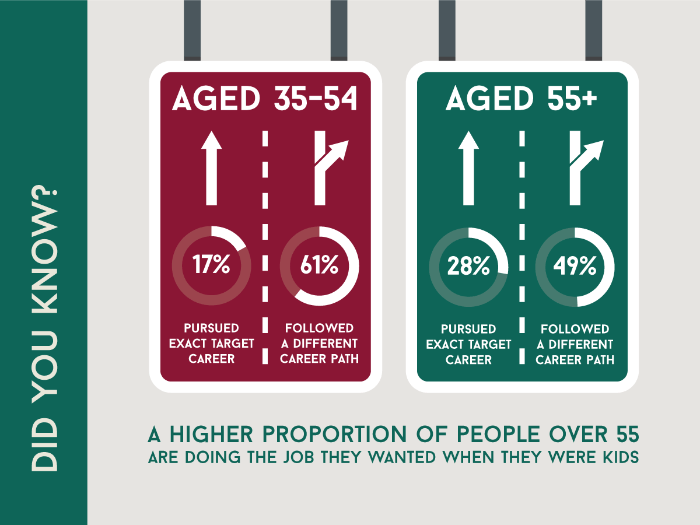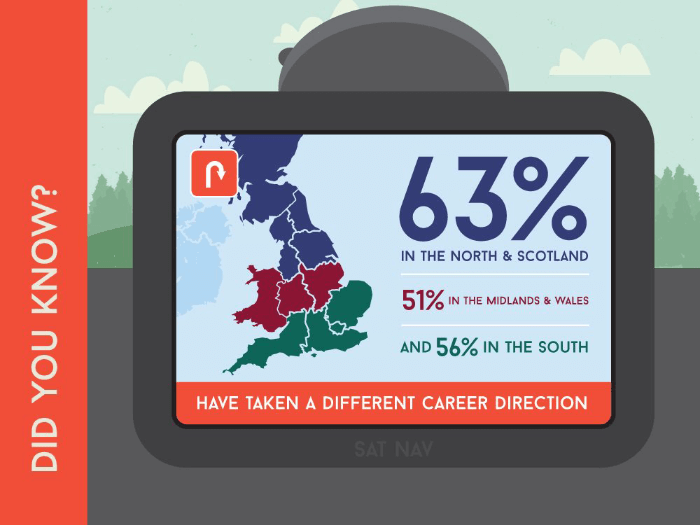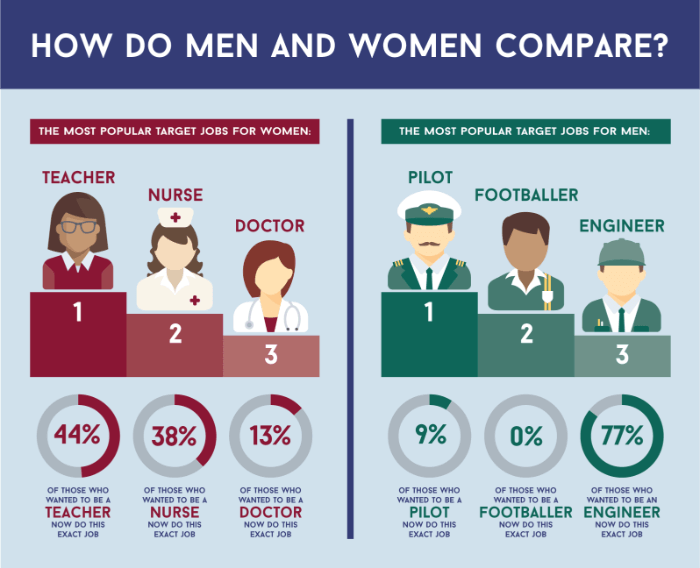‘What will you be when you grow up?’
It’s that age-old question, isn’t it? When we’re children, we tend to have big dreams for our future career. We might want to be an astronaut, a politician, an actor or professional sports star. However, as we age, these dreams often start to shift.
We recently surveyed a sample of adults in the UK and asked them what they wanted to be when they were teenagers starting secondary school. When we compared this to their current role, four key findings emerged.
Career, Age & Location
1. Compared to their younger counterparts, adults over 55 years old were more likely to have pursued their exact career plan, with less than half pursuing a completely different path.
When our parents and grandparents were growing up, they had far fewer career options to choose from compared to today. Particularly in the fast-moving technology sector, more and more career paths are being created. Some of these are roles that previous generations couldn’t have even imagined.
Perhaps this explains why many of the older adults surveyed went on to follow their exact career goal compared to the younger adults, who would have likely had access to a wider range of opportunities as they aged.

When we divided our data by location, we found that:
2. Respondents from the North of England and Scotland were most likely to pursue a different career path to their childhood aspiration. These respondents were also the least likely to say they were unsure of their future career path when they were younger.
This is an important reminder that it’s extremely common for our plans to change. It’s normal to discover new paths or hone different skills that can lead us down an entirely new route.

Career & Gender
We also surveyed the most popular target jobs based on gender. Our research showed that the most popular career goals for girls were teacher, nurse and doctor; for boys: pilot, football player and engineer. Looking at the data, we found that:
3. Women were more likely to follow their planned career path compared to men.
Is this because girls were naturally more ‘realistic’ than boys when it came to thinking about their career goals? Or were they encouraged to only consider certain career options?
4. We also discovered that an overwhelming 93% of participants who had aspired to become engineers were men.
While we do have girls enrol on our Experience Engineering Academy, it is still one of our more male-dominated courses. We asked Ashleigh Clowes, HR Advisor at Nicoll Curtin, how she thinks we can get more girls into engineering:
‘GCSE choices affect A-level choices, A-level choices affect Higher Education choices, Higher Education choices affect career options. It’s about starting young; it comes down to ensuring girls are growing up thinking of a career in STEM (science, technology, engineering and maths) as a viable and appealing option.
It’s vital that both young women and parents understand which qualifications and subjects are required for a career in technology. For example, few young people will understand or realise that taking science at school can lead to a career in robotics or computer gaming.’

Oxford Scholastica Students
Each summer, here at Oxford Scholastica, we have the pleasure of working alongside hundreds of incredible young people from all over the world at our Oxford summer school. All of our students have different dreams and we’re privileged to be able to help them on their path to realising them. What excites us the most is seeing the diversity of goals that our students have.
Future medics and lawyers
To show that diversity, we we’ve created a word-cloud of the career goals of all the girls on our courses:

‘When asked in your interview why you want to study medicine, be honest! You’ll stand out much more by being genuine, even if it sounds clichéd, than if you try to come up with a fancy reason in an attempt to stand out.’
For more advice and expert guidance on applying for a medicine degree, download our free Ultimate Guide to Studying Medicine.
Future entrepreneurs and engineers
We also looked at the popular career ambitions for the boys on our courses:

Business and enterprise cropped up a lot with our male students in particular, but both our Discover Business Academy and our Experience Business & Enterprise Academy are popular with both boys and girls.
We asked Lucy Baxter, entrepreneur and founder of Culture Label, for the advice she wished she’d had when she was younger:
‘There’s often no direct road to success; it’s usually a bumpy road of constant self discovery and hard work. If you arm yourself with optimism, focus and ambition, not only will the journey be much more enjoyable, but you’ll also get there faster!’
We’re passionate about helping students discover career paths that are right for them, whether that means following their childhood dream or discovering something completely new. Our students have the chance to test drive the career they’re hoping to pursue, speak with successful young professionals and develop holistic skills to aid them in their future.
No matter who you are and no matter where you’re from, we believe you can achieve whatever you want to achieve.
Take our free Career Test to receive personalised options, resources and insights.

By Oxford Scholastica Academy
The Oxford Scholastica Academy was founded in 2013 by Jamie and Sophie, two former University of Oxford students, who have built a dynamic education company dedicated to empowering young people to chart their path in the world and make it better.





